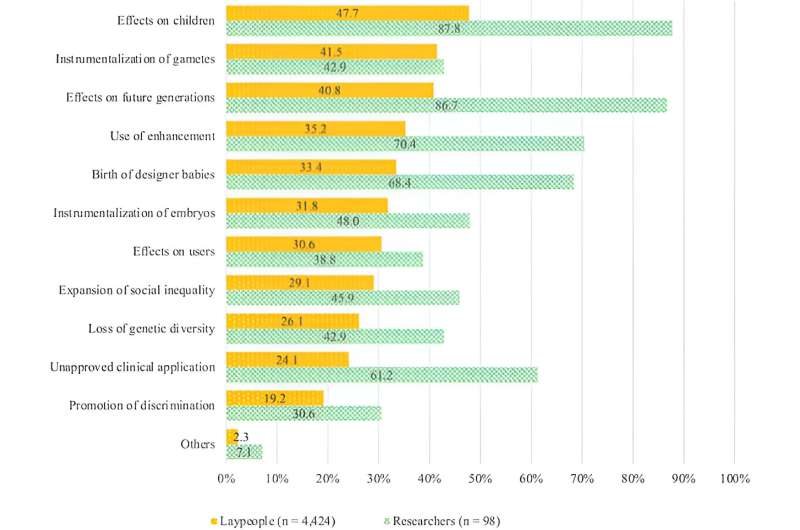This article has been reviewed according to Science X's editorial process and policies. Editors have highlighted the following attributes while ensuring the content's credibility:
fact-checked
trusted source
proofread
Capturing the lay public's opinions on genome editing of human embryos

A recent survey has identified differing opinions between the lay public and trained scientists on genome editing research using human embryos, which will help to guide future bioethical and policy discussions with the lay public.
The survey was conducted by a research team led by Professor Misao Fujita (Uehiro Research Division for iPS Cell Ethics), in collaboration with researchers from Shizuoka Graduate University of Public Health and Hiroshima University. It has now been published in Frontiers in Genetics.
CRISPR/Cas9, one of the primary genome-editing methods, is touted as one of the principal technologies that will serve as a critical foundation for next-generation personalized medicine. The excitement surrounding genome editing for basic and clinical research reached its height in 2020 when Drs. Emmanuelle Charpentier and Jennifer A. Doudna were awarded the Nobel Prize in Chemistry for developing this powerful technique.
However, the use of CRISPR/Cas9 and similar genome editing methods for human embryo research has been murky due to a multitude of ethical concerns stemming from the use of human embryos for research purposes and the genetic modifications of germ cells, as well as a blurring of the line distinguishing basic and clinical research due to its potential for immediate application.
Although previous studies have tried to discern the views on human embryo genome editing, the researchers identified several limitations preventing a clear understanding of how different stakeholder groups may have divergent opinions on these issues.
First, relatively few studies have assessed the acceptance of genome editing in human embryos for basic research, even though it is invariably linked to human genome editing for clinical applications.
Second, there has yet to be an attempt to determine how different stakeholder groups respond to the same questionnaire concerning genome editing research using human embryos to differentiate their responses.
Third, most studies to date have not ascertained the underlying reasoning for respondent answers, thus restricting their usefulness to initiate further discussion about the ethical and social acceptability of human embryo genome editing.
The study surveyed 4,424 lay people, separated into two groups: 2,235 who received explanatory materials about genome editing and 2,189 who did not. In addition, 98 scientists who were members of the Japanese Society for Genome Editing also responded to the same questionnaire. Notably, the research team found a substantial difference in expectations between the lay public and trained scientists for human genome editing.
Whereas most scientists expect genome editing to help reduce intractable diseases (91%), treat life-threatening diseases (90%), and clarify disease etiology (79%), much fewer lay people had such expectations (55%, 40%, and 54%, respectively). The surveyed scientists also had higher expectations for human genome editing to lead to advances in science compared to their lay counterparts (57% vs. 29%, respectively).
In contrast, laypeople and scientists shared similar expectations about the prevention of chronic diseases through human genome editing (46% vs. 52%, respectively) and similar concerns about designer babies (9% vs. 13%) and the use of human genome editing as enhancements (both 14%).
Another notable difference discerned by this study between laypeople and scientists is their concerns about human genome editing. Apart from the "instrumentalization of embryos," scientists were proportionately more concerned about all issues presented, such as "effects on children" and "unapproved clinical application."
However, despite expressing less concern about various issues presented in the survey, laypeople were also less receptive to human genome editing in general, regardless of research purpose (intractable diseases, chronic diseases, infertility treatment, and basic research). Because the survey also differentiated the responses between target tissues (germ cells, surplus embryos from in vitro fertilization [IVF], research embryos, and somatic cells), the research team learned that although genome editing in human somatic cells is in general more acceptable to laypeople for intractable and chronic diseases and infertility treatment, there is a substantial reduction in those who accept genome editing for basic research purposes even for somatic cells.
The researchers suggest that this may be due to the clear research objectives of treating intractable and chronic diseases and infertility compared to basic research, whose research purpose and significance may not be readily understood by the lay public. Similarly, while generally more acceptable of genome editing in germ cells, surplus IVF embryos, and research embryos, laypeople did not perceive any significant differences between the embryo types, possibly due to inadequate awareness of their differences.
Among other findings of interest revealed by this survey, the researchers noted that lay respondents who disapproved of genome editing in human embryos also expressed low expectations for advances in science and the reduction of intractable diseases by genome editing, a clear contrast to the popular opinion shared by scientists on CRISPR/Cas9 and related genomic editing methods, thus suggesting the laypeople who disapprove of human embryo genome editing may be more skeptical of modern science in general and not specifically critical of human embryo research.
While recent advances in stem cell-based human embryo models may help to address or avert some ethical issues concerning the use of human embryos in research, for genome editing and human embryo research to advance and become applicable, this study suggests scientists and policymakers clearly must engage the lay public not only to seek approval but to educate non-scientists on such sensitive yet fundamental research topics.
More information: Kyoko Akatsuka et al, Genome editing of human embryos for research purposes: Japanese lay and expert attitudes, Frontiers in Genetics (2023). DOI: 10.3389/fgene.2023.1205067















